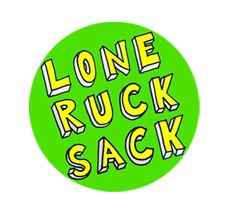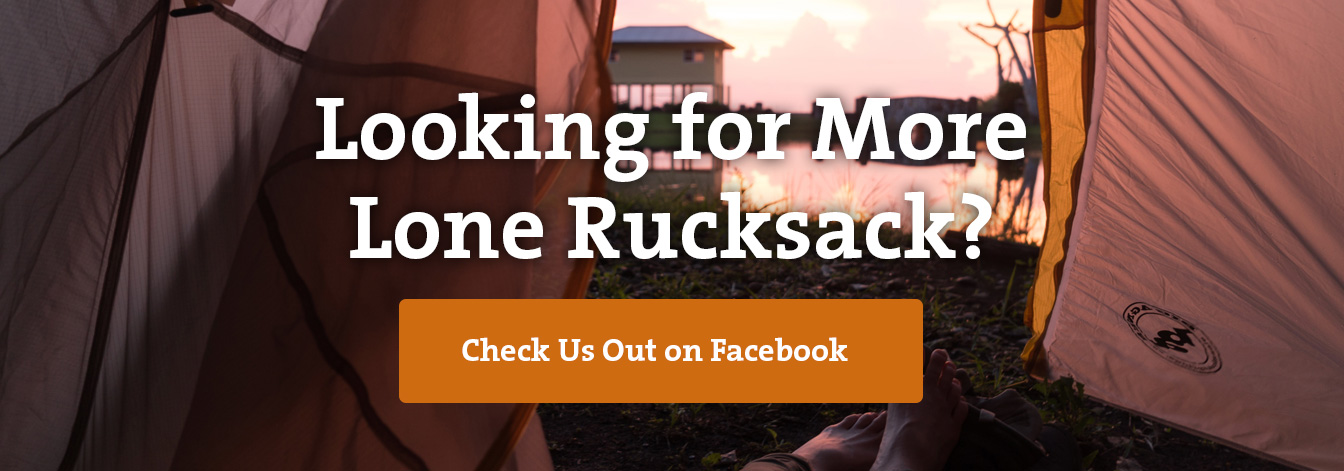In Which I am Hit by a Truck
On the Road from La Ceiba to Tegucigalpa, Honduras // 10 AM
The rain that had filled the potholes on the red dirt road had gone, leaving only empty spaces. My motorcycle bumped up and down as I leaned right and then left, slowing down then speeding up, navigating the twisting road that followed the river through the jungle in Honduras.
I had spent the last two days at a small lodge overlooking a river just outside La Ceiba, giant stones hanging over small rapids that ran through a narrow channel of stone, mist rising from the jungle on the opposite shore. The northern secondary road I had planned to take all the way to Nicaragua from La Ceiba was really just a pot-holed dirt road, so I had decided to take the main highway all the way back to the capital, and head to Nicaragua the following day.
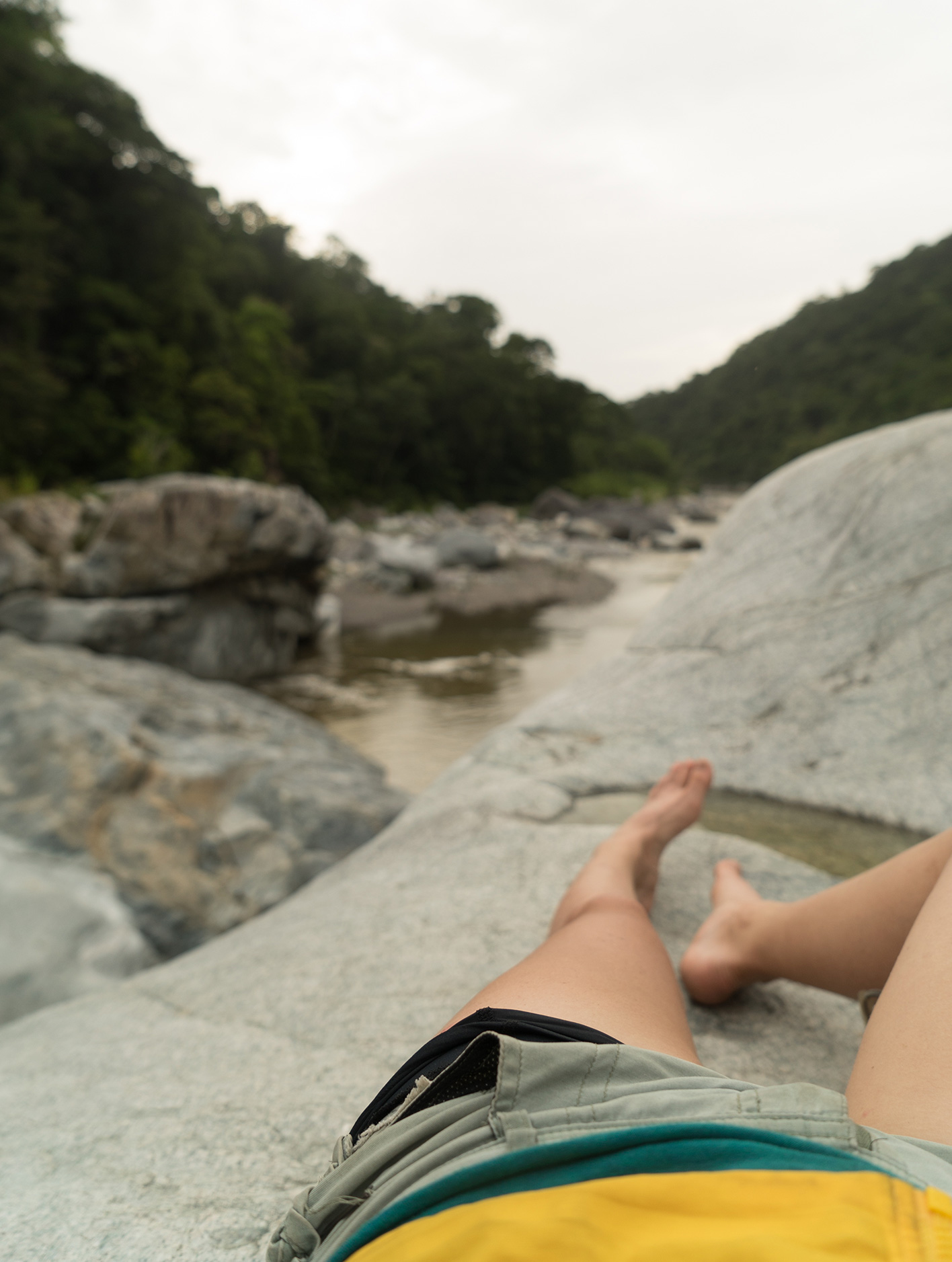
I pulled up to the main highway, leaving the jungle behind me. The roar of the traffic filled my helmet—dusty motorcycles tearing down the street, dilapidated pickup trucks without mufflers and roaring buses spewing dark smoke. Trucks rounded sharp bends while playing chicken with the oncoming traffic, barely missing motorcyclists who would dart in between cars to avoid the passing trucks. Bicyclists rode across streets seemingly unaware of oncoming traffic, pedestrians crossed highways with small children and strollers. Near speed bumps, taxis squeezed by 18-wheelers on the shoulder attempting to move ahead in the line of traffic. It’s like the Wild West, I thought to myself.
At a traffic light in San Pedro Sula, a group of eight small boys ran in front of my motorcycle, then ran back to the sidewalk, than ran out again in the span of ten seconds. I breathed a sigh of relief when I exited the busy city. It’s dangerous to ride a motorcycle anywhere, but in Honduras, I discovered a sort of lawlessness I’d never seen before.
Only a few days earlier, I’d seen a motorcyclist wreck on the same highway. The two lane road stretched up the mountain, and where there was only road, suddenly there was a twisted carcass, like an animal that had tried to cross and was hit. Even then, it seemed like a warning. A crowd of people on the side of the road carried the rider’s body away— a piece of the strewn machine. For the next few days, I remembered the shape of the motorcycle lying across the road, parts of the bike strung across the highway like entrails. Even though I knew it was a bike, I remembered it as an animal.
***

The two lane highway wound through small hills and gas stations, the side of the road dry and dusty. A banged up red truck was in front of me, long metal beams sticking far out from the bed of the truck. There was no one in the distance in the opposite lane, the road stretching on into the horizon. I moved into the left lane, accelerating around the truck.
All of a sudden, a green pickup truck darted in front of the truck I was passing from an opposite street perpendicular to the highway, driving across the road and stopping in the lane directly in front of me. I only had a fraction of a second before I hit, and swerved toward the tiny space left of the road in front of the truck, even though I knew I couldn’t possibly fit. I was riding at 60 mph, and I distinctly remember that tiny bit of negative space, and knowing I would hit. It was only a split second, but it seemed longer—my mind perfectly clear, the road stretching into the distance, the bright sun shining on the shoulders of my motorcycle jacket— and that small, open shape I aimed for.
All of a sudden, I was rolling. I rolled and rolled— I spun across the asphalt, seeing nothing. I could feel the yellow heat, the sound of the gravel underneath my body, and, the metal screech of the motorcycle as it slid across the road— hoping, even as I uncontrollably rolled, I wouldn’t be hit by it. I could feel the weight of the sound, the sharp high-pitched scream of something devastatingly heavy, like an anvil shot across the pavement, something only seconds before had been my ally turned into a 350 pound steel projectile that could easily kill me.
The first thing I saw through my visor as I opened my eyes was a clump of grass my helmet came to rest against. I immediately struggled to pull my helmet off, but couldn’t. At once I was surrounded by people in the bright light, hands behind my head helping me pull my helmet off. Hands started to pick me up. “Don’t move me, don’t move me,” I said in English. If I had a head or spinal injury, I didn’t want to be moved in case it caused further damage, which in itself was a ridiculous thought as I was on the side of the road in rural Honduras, and realistically no one would be arriving with extensive medical knowledge to safely move me to a hospital, spinal injury or not.
I lay on my back, the high-top boot on my right foot halfway on and halfway off, severely spraining my ankle. Something was wrong, but my body seemed disconnected from my brain— I felt nothing but extreme discomfort. I slowly opened and closed my hands. It didn’t feel like I had a head or spinal injury. I could feel hands unlacing the boot and taking it off. As I struggled to pull myself up to my elbows, thinking in a few moments the pain would subside and I could stand, that I would be fine, I saw the pile of open, torn flesh where my knee should have been. “Don’t look don’t look,” a man tried to push me down. “It’s fine,” I said, waving him off.
The skin around the knee is thicker than I thought it would be, I thought, as I examined the sliced open flesh, the lengthwise open piece of skin. Blood trickled out the side of the wound extending from one side of my leg to the other. A bone protruded from the open flesh, so foreign at the time, so utterly out of place when I looked at my leg, I didn’t realize it was my exposed patella.
“Nobody can hurt me without my permission.”
―Mahatma Gandhi
San Pedro Sula, Public Hospital // 2 PM
Hands grabbed at my torn jeans, scissors cutting through the torn fabric from bottom to top, snipping through pockets and belt loops, the metal edge of the blade cool against my skin.
“I didn’t like those jeans anyway,” I said groggily to one of the younger interns in Spanish.
I had arrived at the public hospital in San Pedro Sula after riding in the back of a police pickup truck, my right leg extended out in front of me, a dirty dishtowel draped over my torn leg. Someone in the crowd had called an ambulance, but after lying on the side of the road for fifteen minutes I asked a group of men to pick me up and put me in the back of the police pickup. I asked a woman in the crowd to bring my orange tank bag and red backpack, and the keys to my motorcycle— I didn’t care about anything else, those bags held all my paperwork and camera equipment. Hands underneath my arms and legs deposited me into the bed of the truck like I weighed nothing at all. I didn’t even look for my motorcycle, my world shrank in those few seconds the driver of the pickup decided to cross the highway without looking.
Ten minutes down the road, the police truck stopped. “There’s the ambulance, do you see it?” pointed the woman next to me in the pickup. I expected to see the equivalent of what I was used to in the United States, but what appeared was a stripped metal van. Two men brought a stretcher, slid it into the bed of the truck, and I rolled myself onto it, supporting my injured leg. They deposited the stretcher onto the floor of the empty van, where I bounced up and down on the roads to a private clinic. The medic, the first responder I had seen since the accident, chatted with me a bit, but clearly had no first aid experience. Twenty minutes later we arrived at a private clinic, where they wrapped my leg loosely in gauze, then put me on another stretcher and into another ambulance to transfer to the public hospital.
I lay on the cold table in my underwear, a papery green gown draped overtop my upper body. Two male doctors walked into the already crowded room, standing at the end of the table. One of them held my x-ray and poked at my leg with two fingers, making me gasp in pain. “Fracture,” one told the other. Ignoring me, they both walked out of the room.
“We need to clean the wound,” one of the interns told me, “It’s going to hurt.”
Minutes before, in the waiting room, a young man standing there came up to my bed as I waited, lying in the stretcher. “I love the American people,” he said. “I hope this terrible thing does not give you a bad impression of our country.” When they wheeled me into the examination room, he walked in with me. As they started to clean the wound, this young Honduran man I didn’t know held out his hand, and I took it. I lay staring at the ceiling tiles, squeezing and squeezing his hand as the two interns set the fracture, and cleaned the open laceration on my knee without anesthetic. “I hope you won’t judge our country by what this man did to you,” he said. I never saw him again.
“She is of the strangest beauty and the darkest courage, and when she walks with intent the earth trembles beneath her feet.”
―Nicole Lyons
San Pedro Sula, Public Hospital // Friday, 6 PM
My whole body shook underneath the paper gown, my teeth chattering and my right leg almost completely numb. I knew I was in shock, and I had lost a lot of blood, but there were no blankets or doctors in the dimly lit hallway where I was lying on a metal stretcher. My bed was against the wall at the end of a line of beds full of Honduran men who had also been in motorcycle accidents— most of them draped in swathes of white cotton gauze, white extremities in plastic beds.
I was waiting in the hallway to go into surgery with the orthopedic surgeon, to clean and close the gaping wound in my knee which was packed with dirt and gravel. “You need to get back to the states,” one of the nurses told me. “We don’t have the equipment to fix this here, you need to go to a better hospital,” he said anxiously. I knew I had a fractured fibula, something I could clearly see in the x-ray that lay next to me on my stretcher, but I wasn’t aware I had sustained a tibial plateau fracture— a serious injury that meant the main weight supporting bone in my right leg was fractured near the knee joint.
I wasn’t going to call anyone, refusing the repeated offers of medical personnel handing me their mobiles, but eventually I accepted. Using one of the nurse’s phones, I called my family back in the states. What I wasn’t aware of at the time in Honduras, lying in that hallway, was that call set off a chain reaction in the states. Cathy, a family friend, contacted her Honduran friend Antonio, whose family lived in the city I had wrecked outside of. While I lay in the hallway shaking in the dim light, his family had been searching every hospital in the area for me, asking if a foreign girl had been admitted from a motorcycle accident.
I was so cold, covered in gravel and dirt, my back raw with road rash. The dimly lit hallway ended in a door at one end, a corner at the other. I lay on a thin plastic mattress, an IV bag laying on top of me, disconnected. As I shook, naked underneath the thin gown, the young nurse I had seen in the examination room walked past. He took an interest in me, taking my vitals and gave me his mobile to call my family in the states, where I was able to tell them what hospital I was at.
“You might get into surgery soon, maybe tonight, maybe tomorrow, maybe the day after,” he said.
***
San Pedro Sula, Public Hospital // Friday, 11 PM
“Bend over, and we’ll inject the anaesthetic into the base of your spine. Count backwards…” I woke up to white, bright lights, a curtain separating my upper body from the rest of the room. “Como esta mi pierna?” I shifted groggily, then darkness.
My body was surrounded by frigid air. I could hear the sound of the metal bed rolling across the floor. I was moving. The florescent lights overhead shone through my closed eyelids, a haze of pink and cold and numb. I was in a large room filled with metal beds, naked save a thin green gown draped over my body. I looked to my left, a young man was lying there in a bed looking just as groggy as I did. I smiled at him.
A man walked over to my bed. “Hi, I’m Rafael, Antonio’s nephew. I’ll be back to check on you tomorrow morning and bring you something to eat.” He gave me a pair of athletic pants, and helped me pull them on over the new plaster cast on my right leg. I was so groggy from the surgery, I barely registered what was happening. I found out later, the only reason I had gotten into surgery that night was because Antonio had called in favors with his contacts, and Rafael knew the orthopedic surgeon.
A man came and wheeled me into an elevator, then down a hallway into a dark room. “Can you bring me some water please?” I croaked. At that point I didn’t know whether I was speaking Spanish or English, I had never been so thirsty in my entire life. I hadn’t had something to drink for 18 hours, since I rode out of the jungle that morning. I waited for someone to return. No one did.
The room was dark, several people at the other end illuminated by the shapes their bodies made against the glass. I was deposited on one of the beds in the middle of the room— a thin, empty plastic mattress. I lay against the plastic, bits of dirt and gravel sticking to my back from the accident. My hair stuck to the back of my neck, my leg sticking straight out on the bed in a half plaster cast. I was so thirsty I couldn’t think of anything else. I started to get desperate— there must be a water supply somewhere, I thought, but I couldn’t walk to get to it.
The room was flooded with light as a woman from the far end of the room left, leaving the door open a crack behind her. I struggled to sit up— my entire lower back and upper butt was raw and damp from being scraped across the highway, and my leg in a cast. I made it up to my hands, pulling my body slowly back with my arms.
A few moments later, the door opened again. “Disculpe,” I asked in Spanish, “Could you please bring me some water?” I was so desperate for a drink. “Please.”
She went over to her bed, brought back a bottle of water and a large cup, and poured me a glassful of water. I gulped it down, I didn’t even stop to breathe. She poured me another, and I drank that one just as quickly. “Thank you, thank you,” I told her gratefully in the dark, and slid back down the plastic mattress into the darkness once more.
***
I woke in the grey light, the large room visible by the light pouring through the glass window at the far end, green trees and a pale sky in the distance. There were four beds in the room, one to my left, and two more beds to my right. Each bed was adorned in what looked like personal belongings from home, patterned sheets and pillowcases, blankets and oscillating fans. One person sat next to each bedside, all women— they had slept there overnight in small plastic chairs, heads leaning against the foot of each mattress.
Three women gathered around the foot of my bed, asking me what had happened and why was I there at the public hospital. One of the women left the room, and came back with a patterned sheet, and before I knew what was happening, they had half lifted me up, pulled the sheet over the mattress, put a pillow behind my head, brought me a juicebox and a bottle of water, and angled one of their fans toward me.
I asked them where the doctors were, I hadn’t seen anyone since I was wheeled in late the night before.
“You won’t see anyone before Monday,” one woman told me in Spanish, “The medics don’t work on the weekends.”
***
San Pedro Sula, Public Hospital // Saturday, 6 AM
Rafael, Antonio’s nephew, arrived early that morning. I found out later he had worked an entire shift before ending work and coming to visit me, where he stayed the rest of the day. He pulled up a chair next to my bed, noting how the women in the room were taking care of me. He recommended I move to a private hospital where I’d receive regular, quality antibiotics. One of his friends worked at a private military hospital in San Pedro Sula, and later that day he pulled strings to move me there, even though it was full. He went to the hospital to arrange everything, confirmed the daily price of a bed and quality antibiotics (“Give her the best stuff you have,” he told them). While he was gone, his grandmother Rafaela sat with me at the hospital, trying to get me to eat something.
Shortly after Rafael returned, a man and a woman arrived with a stretcher and clipboards to take me to the military hospital. We were still waiting for the nurses at the public hospital to sign the release paperwork. I hadn’t had any antibiotics since surgery the night before, which was critical, because of my open fracture and how contaminated the wound was— during surgery the night before, the orthopedic surgeon spent hours cleaning gravel out of my leg.
All of a sudden, I heard shouting in the hallway, and Rafael came storming into the room. “We’re going,” he said, “without the release paperwork.”
I was transferred onto another stretcher, another ambulance, that bounced over speedbumps and potholes. We arrived at the private military hospital, a clean, sunny yellow place, where I was able to see the sky as they wheeled me under the awning and whisked me behind a curtain to put me on an IV with the strongest pain medication I’ve ever experienced. I tried to ask them to stop, but found I could no longer form coherent words.
I ate dinner with my bare hands— my movements becoming increasingly wild as I tried to find and hold the lettuce with my right fingers, my dominant left hand held captive by the IV pumping gasoline quality antibiotics into my veins. Eventually I gave up as my shirt was littered with lettuce and bits of dressing. I remember trying to joke with the nurse about it (which realistically at that point, was probably nonsensical babble) who gave me a strange look, then left.
They took an ultrasound of all my major organs as I tried to joke with the doctor, but again, I could barely form a sentence. Afterwards, I spend a fun half hour in the x-ray room with two Honduran men, where we darkly joked about motorcycle accidents and talked about riding in Honduras and the United States, and traded English and Spanish slang.
“Why aren’t you crying?” one of the men asked, as we took the fourth x-ray, while I twisted myself and my broken leg unnaturally on the table. “If you were a man you’d be crying,” he said.
One of the men told me how his young son had also been in an accident earlier that day. He had climbed onto the family’s scooter and taken it for a brief ride before falling off and hitting his head. His family was at the hospital with his son in another city at that same moment. “I’m so sorry,” I said, “I wish you could go to him.”
“Someone carry my son, now I carry you,” he said.
“It is our choices, Harry, that show what we truly are, far more than our abilities.”
—J.K. Rowling
I spent five nights at the military hospital. I barely ate or slept, the florescent lights illuminating the room every few hours, as the promised antibiotics regularly arrived. I was so dehydrated, several times a day they’d have to find a new vein for the IV, so by the time I left, both my hands were bruised and sore from being prodded by the 14 or so different IVs.
There was an antibiotic for the staph infection, then another for post-surgery. Once a day, two nurses would come in to clean the laceration and stitches. I would watch, fascinated at the process, and asked them endless questions about what they were doing and why. I drew a line around the enormous staph infection, and monitored it every day, to make sure it was, in fact, receding. Most of the time, I had no energy to do much of anything save stare out the large window to my left, which had a view of a small mountain covered in the greenest grass I had ever seen, the bright blue sky behind it.
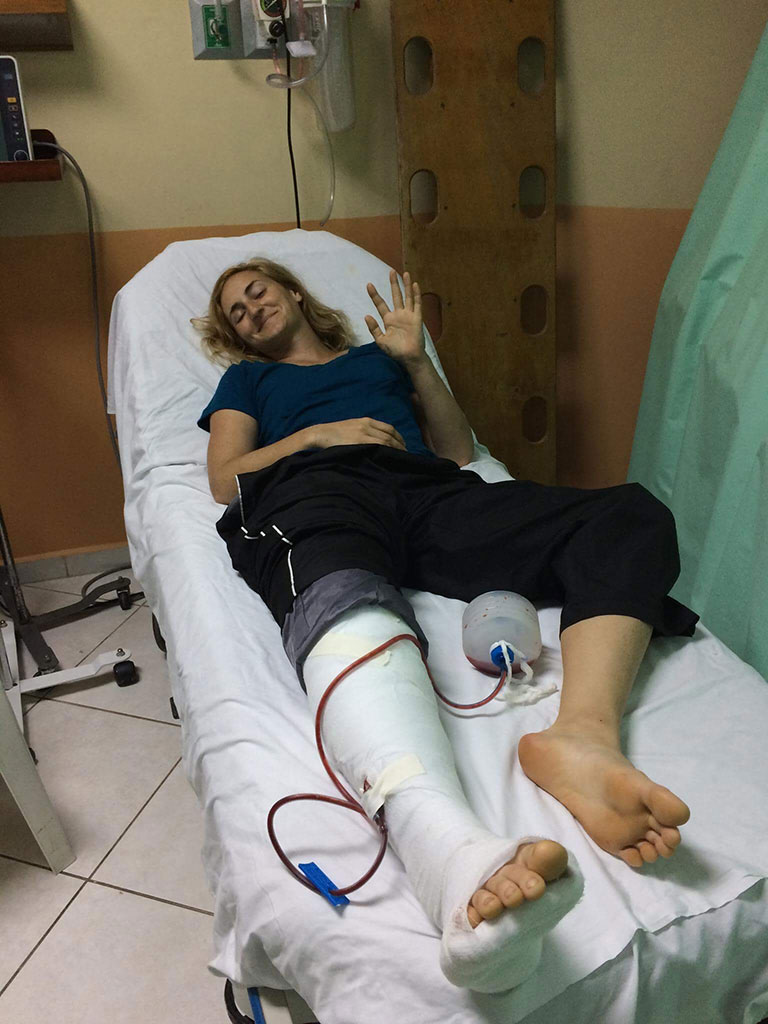
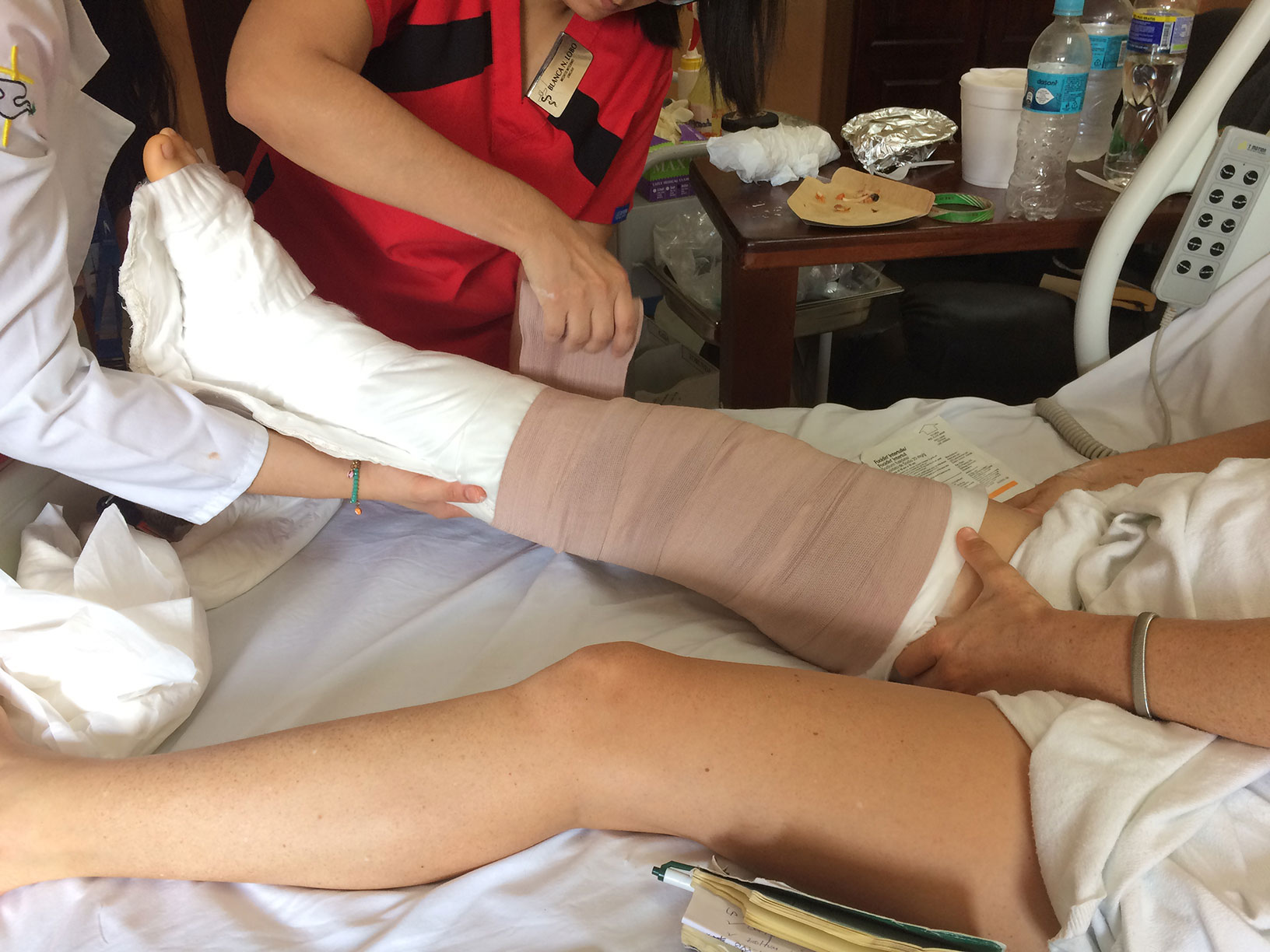
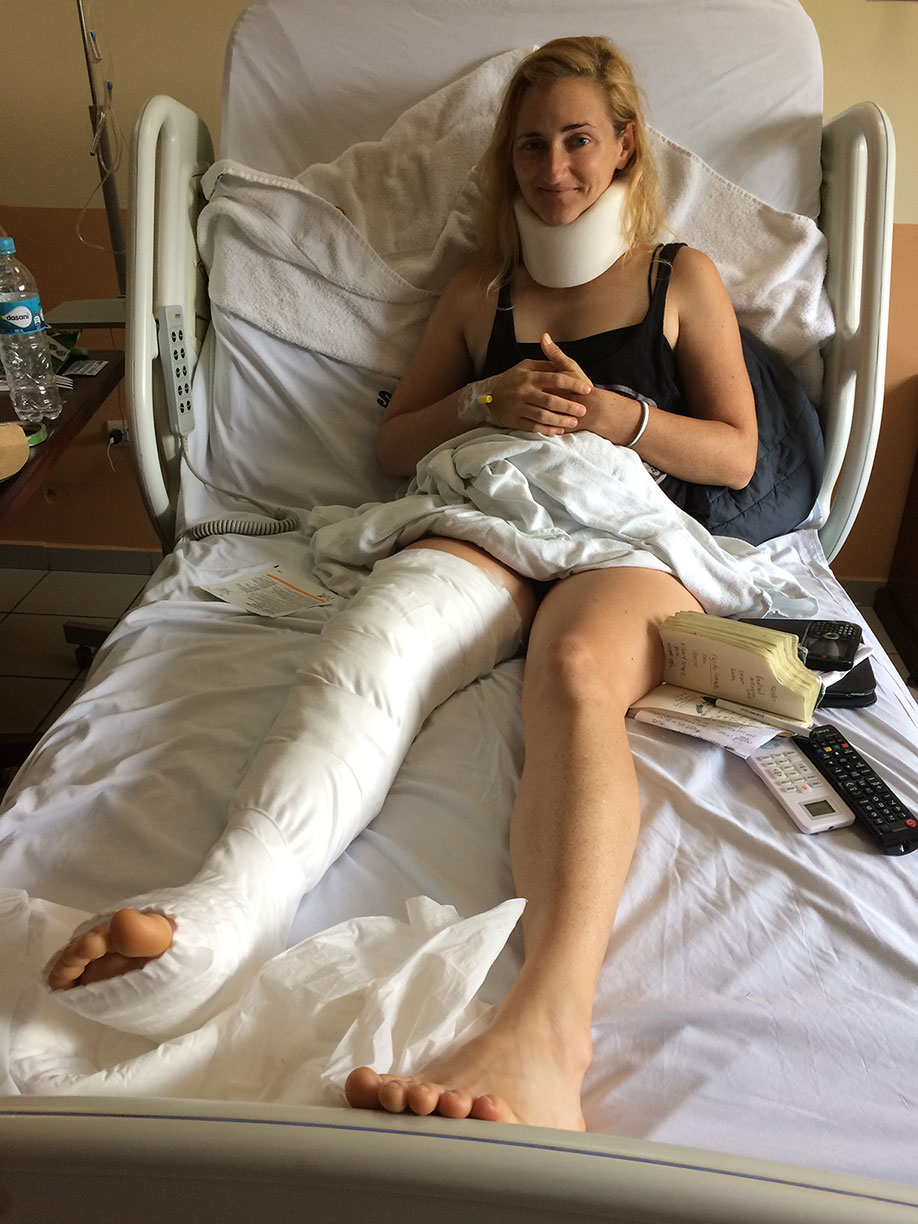
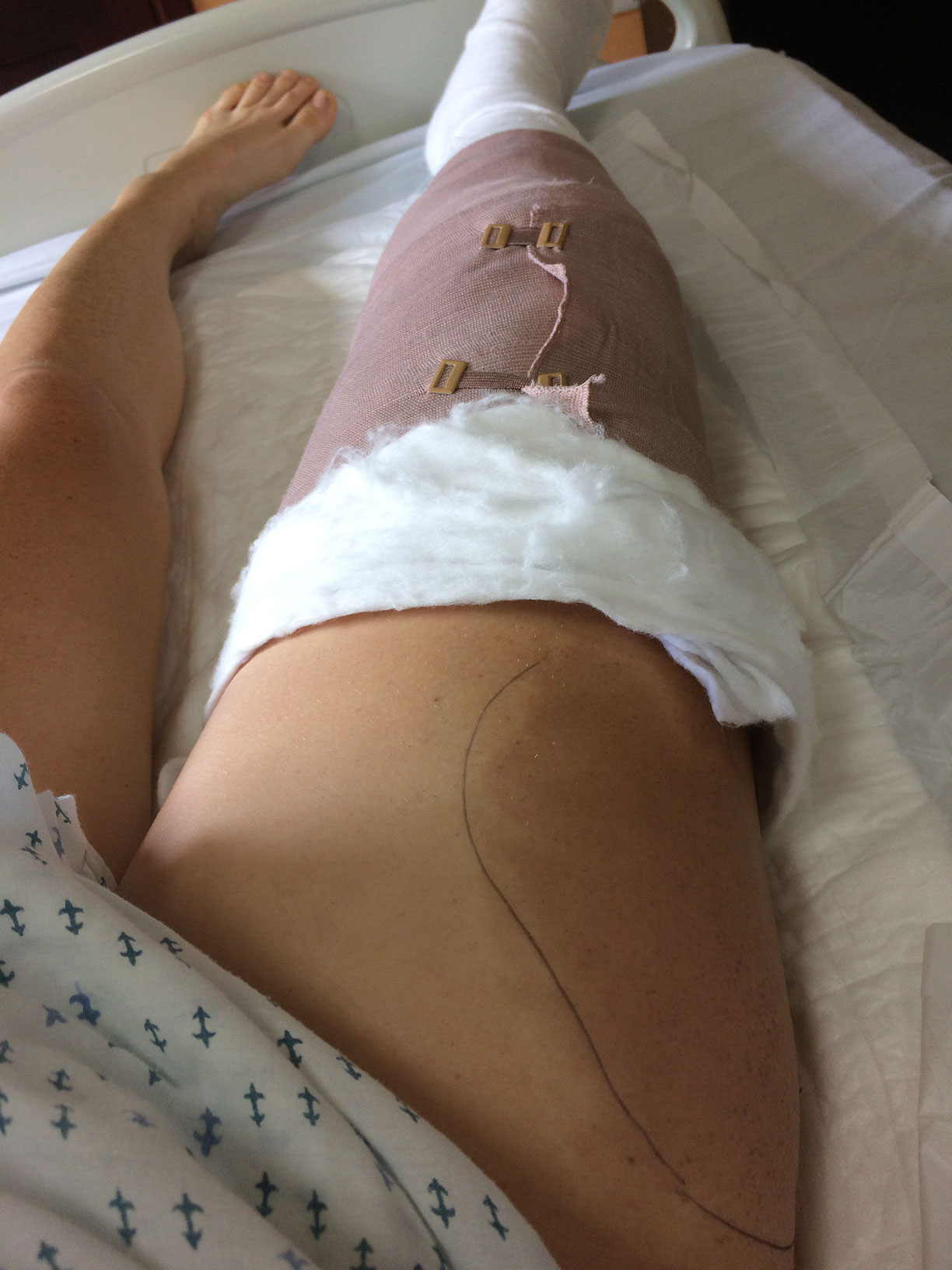
***
In the early hours of Thursday morning, I left the military hospital to fly back to the states, to continue my recovery. The orthopedic surgeon told me I’d be walking in a month, but when I returned to the states I found out my injury was more serious and complicated than what I’d been told in Honduras. I didn’t know then I’d spend the next two months in a wheelchair, and the month after that on crutches. I didn’t understand that I’d lose a huge percentage of my body’s muscle mass from being so inactive, that I’d spend an additional three months once I was cleared for weight bearing trying to gain it back, and that same time period re-learning to walk.
Even though I’d never be the same again, in 7 months to a year after I left Honduras, I’d be able to ride my motorcycle again, to go running, to carry a backpack into the mountains on my own two legs.
“Maybe your country is only a place you make up in your own mind. Something you dream about and sing about. Maybe it’s not a place on the map at all, but just a story full of people you meet and places you visit, full of books and films you’ve been to. I’m not afraid of being homesick and having no language to live in. I don’t have to be like anyone else. I’m walking on the wall and nobody can stop me.”
― Hugo Hamilton
If I could go back in time and find the woman I was, riding her motorcycle in the sunshine, and talk to her, tell her what was to come, I would not. We save ourselves, every day, by fighting for what we need and what we dream of, and by searching for it. We have to build the life we want, even if it means building it from the remains of what we’re left with, after what’s been done to us.
When I was lying on the side of the road with my leg torn open, bleeding— I don’t remember pain, or anger at what had been done to me, I remember kindness. I was never upset, but endlessly calm about what was happening. Maybe that meant I was strange, or like so many people before had called me— emotionless— but I don’t think so. I was grateful. Even on the side of the road, I was so grateful to find kindness, to find people who wanted to help me even though they didn’t have to. They gave me something far more valuable than what I had lost in the accident. I had to trust in the people around me in Honduras, and they didn’t let me down— and that alone, to see people fighting for me, was something I had not experienced before, and it changed me.
We’re all looking for something— struggle helps us realize it. Love helps us realize it. Whether it’s belonging, finding our place in this world, or meaning in this life, all we can do is follow time through the days, and accept what we’re presented with grace and with openness. We endure and find the beauty in what life presents. This I knew, just as I knew the sun would rise, the light passing overhead like small fragments of time to shape us. To illuminate us in the dawn.
